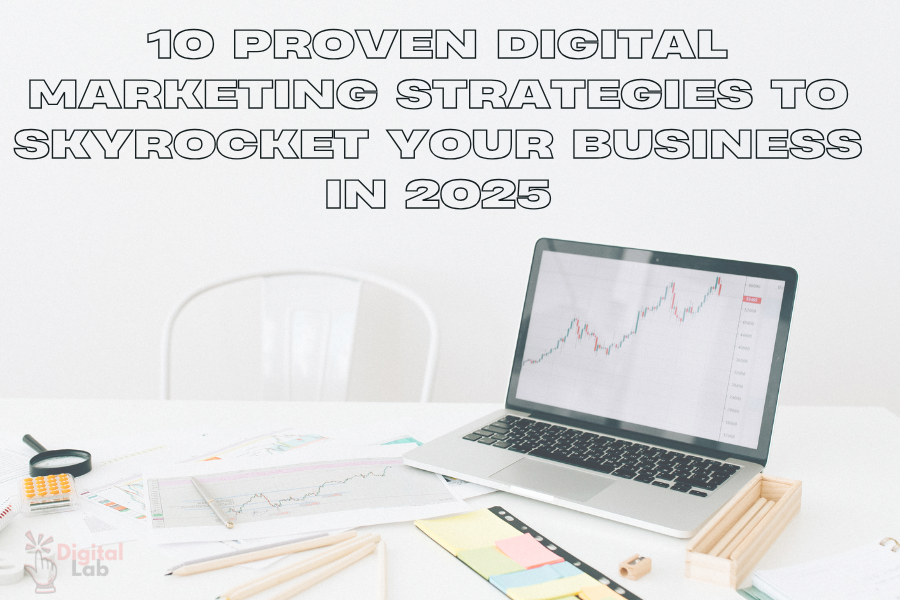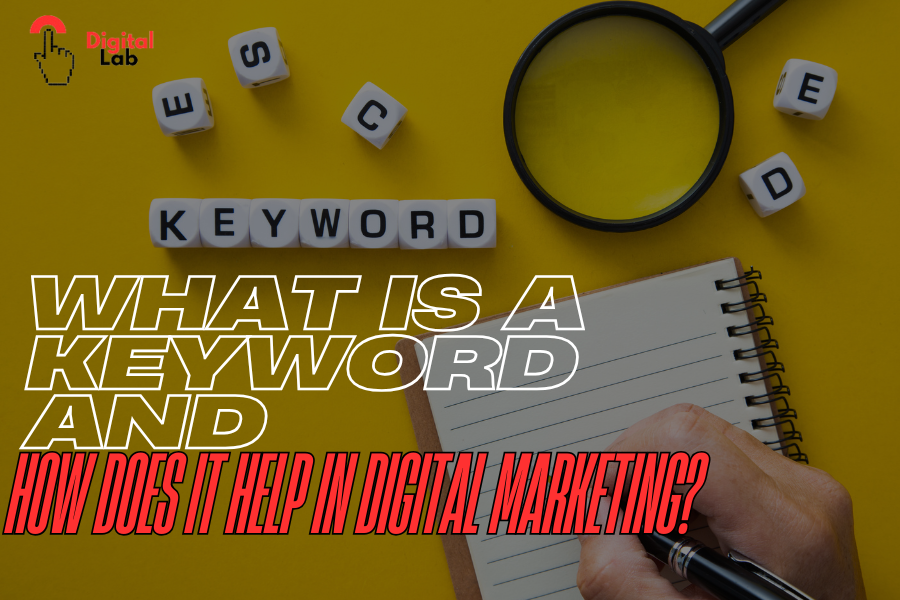In today’s fast-paced digital world, having a strong online presence is no longer optional—it’s essential. Whether you’re a startup or an established business, leveraging the right digital marketing strategies can help you reach your target audience, boost brand visibility, and drive conversions. At Digital Lab, we specialize in crafting innovative and data-driven marketing solutions tailored to your business needs. Here are 10 proven strategies to help your business thrive in 2025. Master Search Engine Optimization (SEO) SEO is the backbone of digital marketing. By optimizing your website for search engines, you can rank higher on Google, attract organic traffic, and generate quality leads. Focus on: Keyword research and implementation On-page SEO (meta tags, headers, alt text) Off-page SEO (backlinks, guest blogging) Technical SEO (site speed, mobile-friendliness) At Digital Lab, we use advanced tools and techniques to ensure your website ranks at the top of search results. Leverage Pay-Per-Click (PPC) Advertising PPC campaigns, such as Google Ads and social media ads, offer instant visibility and measurable results. With precise targeting, you can reach your ideal audience and maximize ROI. Our team at Digital Lab creates high-converting PPC campaigns tailored to your budget and goals. Create High-Quality Content Content is king! From blog posts and videos to infographics and eBooks, valuable content establishes your authority and keeps your audience engaged. Our content marketing experts at Digital Lab craft compelling stories that resonate with your audience and boost your brand’s credibility. Optimize for Local SEO If you’re a local business, optimizing for local SEO is crucial. Claim your Google My Business listing, gather reviews, and use location-based keywords. Digital Lab ensures your business stands out in local searches, driving foot traffic and online inquiries. Embrace Email Marketing Email marketing remains one of the most effective ways to nurture leads and retain customers. Personalize your emails, segment your audience, and track performance metrics. At Digital Lab, we design email campaigns that deliver results. Embrace Email Marketing Email marketing remains one of the most effective ways to nurture leads and retain customers. Personalize your emails, segment your audience, and track performance metrics. At Digital Lab, we design email campaigns that deliver results. Utilize Influencer Marketing Partnering with influencers can amplify your brand’s reach and credibility. Identify influencers who align with your brand values and collaborate on campaigns that drive results. Digital Lab connects you with the right influencers to elevate your marketing efforts. Analyze and Optimize with Data Data-driven decisions are key to successful digital marketing. Use tools like Google Analytics to track performance, identify trends, and optimize your strategies. At Digital Lab, we provide detailed analytics reports and actionable insights to keep your campaigns on track. Stay Ahead with Emerging Trends The digital marketing landscape is constantly evolving. Stay ahead by adopting emerging trends like AI-powered marketing, voice search optimization, and interactive content. Digital Lab keeps you updated with the latest innovations to ensure your business stays competitive. Digital marketing is a powerful tool to grow your business, but it requires expertise and a strategic approach. At Digital Lab, we combine creativity, technology, and data to deliver exceptional results. Whether you need SEO, social media management, or a full-fledged marketing strategy, we’ve got you covered. Contact Digital Lab today and let’s create a winning digital marketing plan together! Explore our services at www.digital-lab.in or schedule a free consultation to see how we can transform your digital presence. Let’s grow your business, one click at a time!
What is a Keyword and How Does It Help in Digital Marketing?
The Strategic Role of Keywords in Digital Marketing In the field of digital marketing, keywords serve as an indispensable foundation, anchoring strategies designed to enhance online visibility and audience engagement. Whether integrated into content creation, search engine optimization (SEO), or pay-per-click (PPC) advertising, an advanced understanding of keywords is crucial. This discussion delves into the strategic role of keywords in digital marketing and their significance in achieving core objectives. What Are Keywords? A keyword is a specific word or phrase that users input into search engines like Google, Bing, or Yahoo to locate information, products, or services. These terms range from single words (e.g., “shoes”) to longer, more descriptive phrases known as long-tail keywords (e.g., “best running shoes for marathon beginners”). Keywords act as a bridge connecting user queries with relevant digital content. By analyzing these terms, search engines assess content relevance, thereby determining visibility in search results. Types of Keywords Keywords can be categorized based on length, specificity, and intent: 🔹 Short-Tail Keywords: Generic terms (e.g., “furniture”) that attract high search volumes but are highly competitive. 🔹 Long-Tail Keywords: Specific phrases (e.g., “eco-friendly furniture stores in New York”) that generate lower search volumes but yield higher conversion rates due to their precision. 🔹 Transactional Keywords: Keywords signaling purchase intent, often containing terms like “buy,” “discount,” or “cheap.” These are critical for e-commerce campaigns. 🔹 Informational Keywords: Typically framed as questions (e.g., “How to improve website traffic?”), these cater to audiences seeking knowledge or solutions. 🔹 Branded Keywords: Keywords incorporating brand names (e.g., “Nike running shoes” or “Apple MacBook”), essential for brand-focused strategies. Why Keywords Are Vital in Digital Marketing? Keywords are integral to various aspects of digital marketing. Their significance spans multiple domains: 🎯 Search Engine Optimization (SEO) Keywords underpin SEO strategies, enabling websites to rank prominently in search engine results pages (SERPs). Thoughtful keyword selection and placement drive organic traffic and establish online authority. 📖 Content Development Analyzing popular search terms allows marketers to create relevant and engaging content. For example, a search trend like “effective strategies to boost website traffic” can inspire informative blog posts tailored to user needs. 🚀 Pay-Per-Click (PPC) Campaigns In PPC advertising, keywords determine the alignment between user intent and ad placements. Tools like Google Ads Keyword Planner help identify high-performing keywords, optimizing budgets and maximizing ROI. 🔎 Audience Analytics Keywords provide valuable insights into audience behaviors and preferences, enabling marketers to adjust strategies to meet evolving consumer needs. 🔄 Competitive Differentiation Analyzing competitors’ keyword usage reveals gaps and opportunities. Tools such as SEMrush and Ahrefs aid in crafting campaigns targeting underserved niches. Best Practices for Effective Keyword Usage 🔗 Rigorous Keyword Research: Leverage tools like Google Keyword Planner, Ahrefs, or SEMrush to discover impactful keywords with optimal search volume and manageable competition. 🔍 Focus on User Intent: Align keywords with specific user intents—whether informational, navigational, or transactional—to improve relevance. ❌ Avoid Keyword Stuffing: Overusing keywords can harm readability and SEO rankings. Aim for seamless and natural integration. 🔄 Capitalize on Long-Tail Keywords: These keywords provide higher specificity and lower competition, often leading to better engagement and conversions. ⏳ Monitor Performance Regularly: Evaluate the effectiveness of keywords and adjust strategies to stay aligned with market trends and user behavior. Keywords are far more than search terms—they are strategic tools that drive digital marketing success. Their thoughtful application improves online visibility, attracts targeted traffic, and supports broader marketing objectives. For professionals in SEO, content marketing, and advertising, mastering keyword research and implementation is essential to maintaining a competitive edge in the ever-evolving digital landscape.
10 Proven SEO Strategies to Improve Your Website’s Ranking in 2025
In today’s digital world, having your website rank high on search engines is crucial. Search Engine Optimization (SEO) can seem complex, but with the right strategies, you can significantly improve your website’s visibility and ranking. Here are 10 proven SEO strategies to help you get started in 2025: Quality Content is King: High-quality, informative content engages users and encourages them to spend more time on your site. Regularly update your blog or website with valuable content that meets the needs and interests of your audience. Mobile Optimization: Ensure your website is mobile-friendly. With more people using mobile devices to browse the internet, search engines prioritize mobile-optimized sites. Keywords and Phrases:Use relevant keywords and phrases naturally throughout your content. Conduct keyword research to find terms your target audience is searching for. Avoid keyword stuffing, as it can negatively impact your ranking. Optimize Page Speed: A fast-loading website improves user experience and reduces bounce rates. Use tools like Google PageSpeed Insights to analyze and enhance your site’s speed. Meta Tags:Use effective meta tags, including title tags, meta descriptions, and header tags. These elements provide search engines with information about your content and improve your click-through rates. Backlinks: Earn backlinks from reputable websites. Backlinks act as endorsements for your site, boosting your credibility and ranking. Focus on creating shareable content to attract natural backlinks. User Experience (UX): Ensure your website is easy to navigate and user-friendly. A clear, logical structure and intuitive design enhance user experience and encourage return visits. Regularly Update Content: Fresh content is favored by search engines. Update your existing content and add new posts regularly to keep your site relevant and engaging. Social Media Integration: Promote your content on social media platforms to increase visibility and drive traffic to your website. Social signals can positively impact your search engine ranking. Monitor and Analyze: Use SEO tools like Google Analytics to track your website’s performance. Regularly analyze your data to identify areas for improvement and adjust your strategies accordingly. By implementing these 10 proven SEO strategies, you’ll be well on your way to improving your website’s ranking in 2025. Stay proactive, keep learning, and adapt to the ever-changing SEO landscape to maintain your competitive edge.
Top 10 Digital Marketing Trends to Watch in 2025
As the digital landscape evolves, staying ahead of the curve is crucial. Here are the top 10 digital marketing trends to watch in 2025: Artificial Intelligence (AI) and Machine Learning (ML) : AI and ML are transforming digital marketing by providing insights into customer behavior, predicting trends, and personalizing experiences. From chatbots to predictive analytics, these technologies enhance efficiency and effectiveness. Voice Search Optimization: With the rise of smart speakers and voice assistants, optimizing for voice search is a must. This means focusing on natural language and long-tail keywords to capture voice queries and improve search rankings. Visual and Video Content: Videos and visual content continue to dominate. Platforms like YouTube, TikTok, and Instagram Reels are essential for engaging audiences. Short-form videos, behind-the-scenes clips, and visual storytelling are key strategies. Content Personalization: Tailoring content to individual preferences boosts engagement. By leveraging data and AI, marketers can create personalized experiences, from customized emails to targeted ads. Influencer Marketing 2.0: Influencer marketing is evolving. Micro-influencers and nano-influencers are gaining traction due to their niche audiences and higher engagement rates. Authenticity and transparency are critical in influencer partnerships. Augmented Reality (AR) and Virtual Reality (VR): AR and VR are creating immersive experiences, from virtual product try-ons to interactive advertisements. These technologies offer innovative ways to engage customers and enhance brand interactions. Privacy and Data Security: With increasing regulations and consumer awareness, prioritizing privacy and data security is essential. Transparent data practices and compliance with privacy laws build trust and protect user information. Shoppable Posts and Social Commerce: Social media platforms are becoming shopping hubs. Shoppable posts and social commerce features allow users to purchase directly from social media, streamlining the shopping experience. Interactive Content: Quizzes, polls, surveys, and interactive infographics engage users and encourage participation. Interactive content not only entertains but also provides valuable insights into customer preferences. Sustainability and Ethical Marketing: Consumers are increasingly valuing sustainability and ethical practices. Brands that promote eco-friendly products and socially responsible initiatives resonate with conscious consumers.




